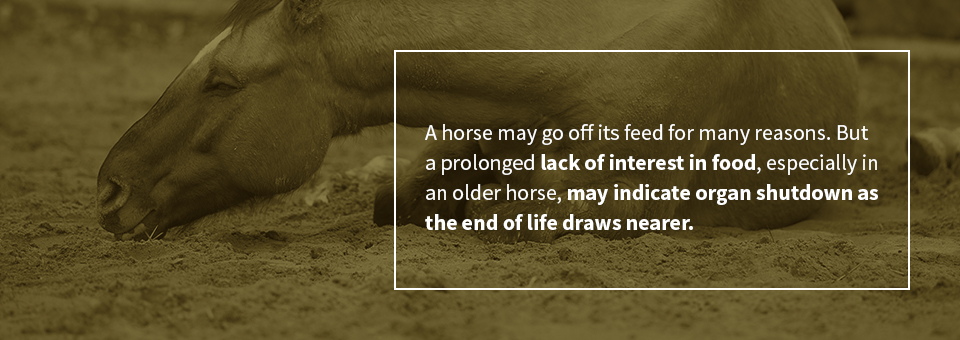
Horses teeth erupt through the surface of the gum almost all its life until the tooth itself is completely worn down. If the horse dies on his own nature has taken its course.

Some individuals age more quickly or slowly depending on physiologic conditions she explains.
What happens when a horse dies of old age. Diseases of the digestive system were by far the most common cause of death in older horses summarized Crandell. Specifically 100 of the horses 42 succumbed to gastrointestinal disease including impactions ruptures displacements and strangulations. The signs of natural aging in horses like these are often accompanied by additional symptoms due to diseases like Cushings disease or osteoarthritis that older horses may be more prone to than their younger counterparts.
What happens when a horse dies of old age. Currently old age is frequently reported as a cause of death. Throughout the industry horse owners have generally thought that the leading causes of illness in older horses included lameness due to arthritis or chronic laminitis colic heaves and Cushings disease.
What happens when a horse dies of old age. Currently old age is frequently reported as a cause of death. Throughout the industry horse owners have generally thought that the leading causes of illness in older horses included lameness due to arthritis or chronic laminitis colic heaves and Cushings disease.
All horses will die naturally from old age between the ages of 23 years 11 months and 30 years. This is decided by chance and can happen any day once a horse is within this time frame. Right now there is no upper age limit for breeding and competing and horses do not get any penalties due to old age or being pregnant.
In most cases the horses I put down were old but a few also had life threatening injuries or illness. Owners of a horse often ask me how they will know when it is time to let a suffering horse go and I tell them to let the horse decide. A horse that is ready to die will often stop eating or lay down for longer and longer periods.
If you dont know your horses date of birth one way tell its age is by its teeth. Telling a horses age by looking at its teeth is not exact but it will tell you the approximate age. Horses teeth erupt through the surface of the gum almost all its life until the tooth itself is completely worn down.
When a large animal dies it is both heart breaking and complicated. I asked the vet that treated my horse how they handle it and the response was to send the remains to a rendering facility. That was a completely unacceptable option to me.
All vets are independent so others might handle it better. When the horse ages another year the pair just to the outside of the middle teeth will wear away next and so on. When all of the cups have worn away a horse is approximately eight to ten years old.
Another mark that can aid us in judging a horses age is the dental star. Despite the growing body of research into senior horses health the exact causes of death and the most important diseases that older equids suffer from remain poorly documented. One of the things every horse owner should consider is the fact that horses dont live forever nor do they stay rideable forever.
It might seem overly simple to state it in that fashion but we really dont like to think about horses getting old getting hurt or dying. Our imaginations enable us to envision the Black Stallion living in endless gloryand even though we understand the. Many horse breeds grow close to their final height by the age of 4 or 5 years old then fill out more over the next 2 or 3 years.
Large horse breeds like draft horses dont stop growing until they are 8 years old. The final size of a horse can be impacted by a variety of factors like genetics and breed. Facing Reality After Your Horses Death.
The quiet peace of a sunlit meadow - Loving memories. Your horse is gone. Whether this occurred unexpectedly after an accident or whether it was a decision made with love and courage for a beloved senior horse who was ill and in pain - now you face some major decisions as well as handling your own feelings.
Horses can be born with congenital defects that can lead to sudden death. There may be no outward sign that anything is wrong in the foal. Depending on what the congenital defect is the horse may survive until adulthood but suddenly die.
Some cardiac defects manifest clinically this way. One of the most difficult decisions a horse owner has to make concerns the old or sick horse that has to be put down. I know I had to make the decision with SAM see Horsetalk Archives.
If the horse dies on his own nature has taken its course. The horse and Mother Nature made the decision. Some individuals age more quickly or slowly depending on physiologic conditions she explains.
Some show signs of aging as early as 16 and some dont look old until theyre in their mid-20s. It is not unusual for minor muscle tremors noises or twitching of the more sensitive parts of the horse such as the nostrils and muzzle to occur for a short time after death. This is a natural response of the body systems and though this may be of concern to the horses owner it is not an indication that the euthanasia has not been successful.